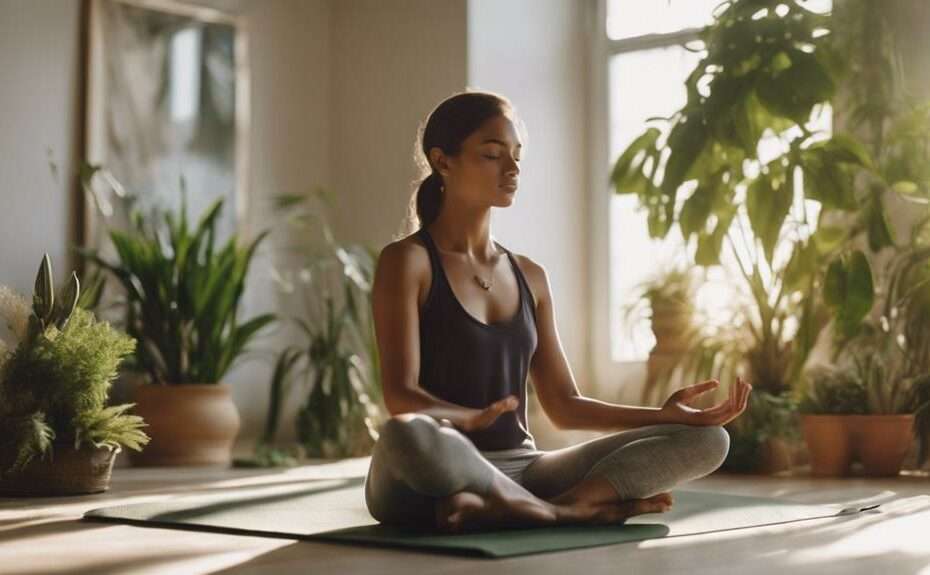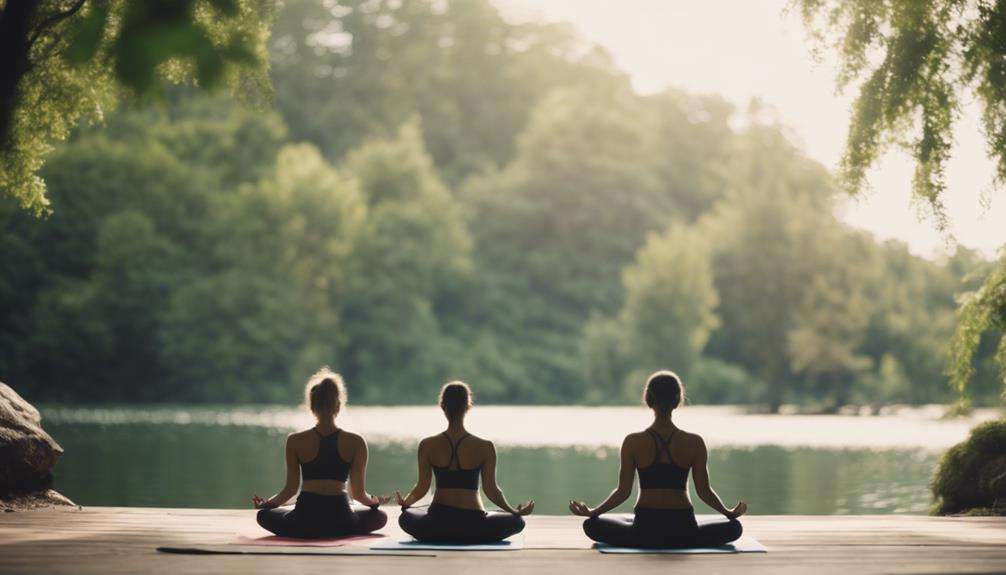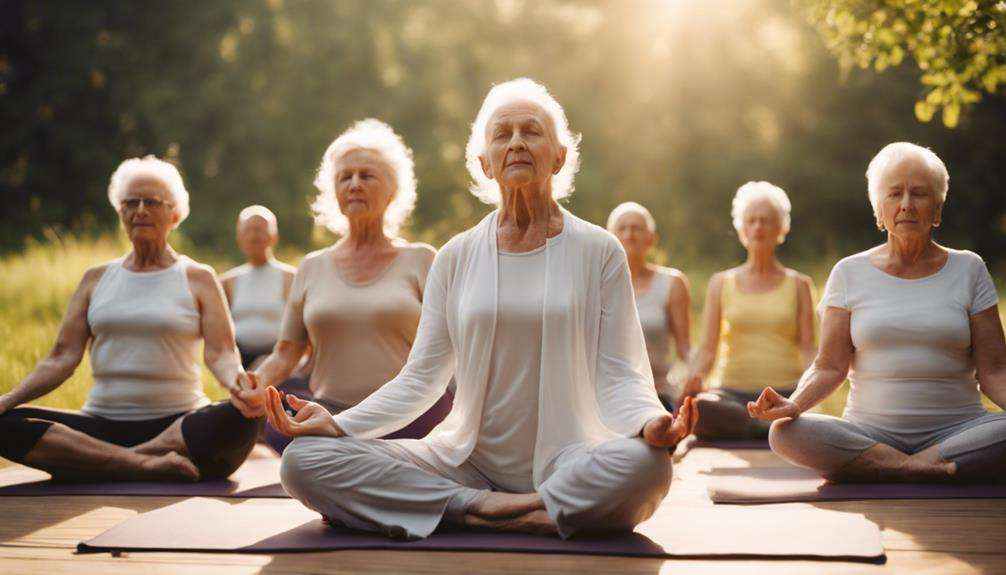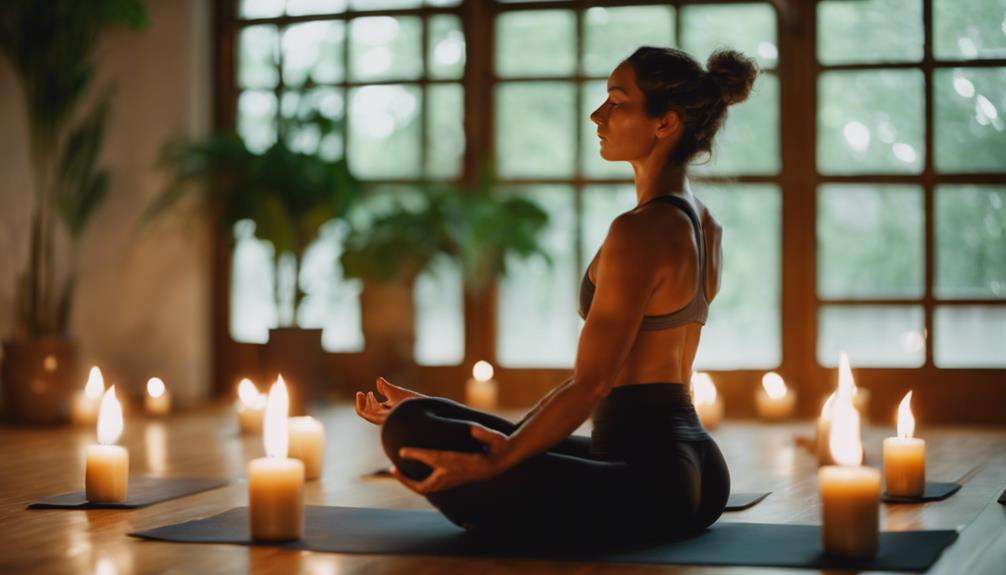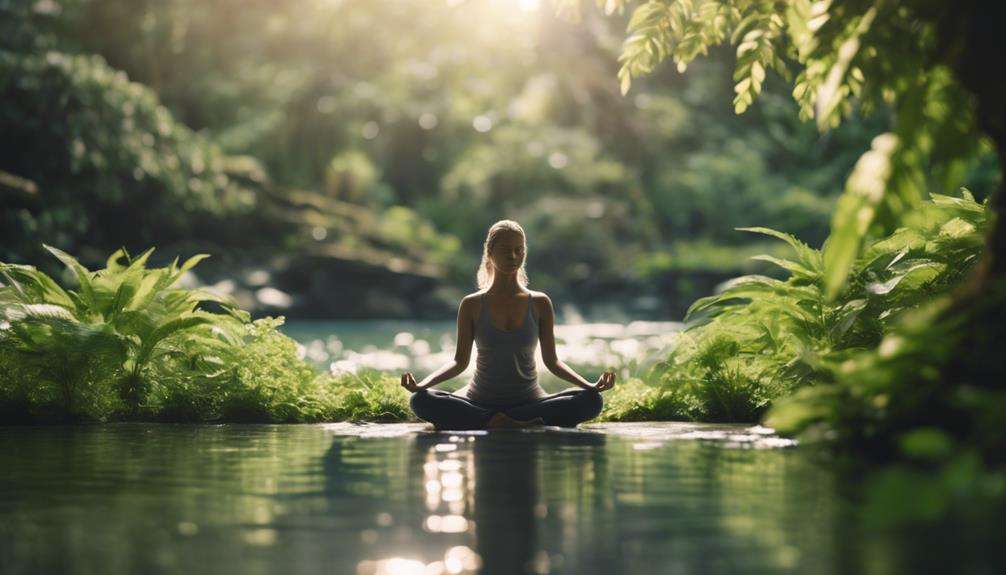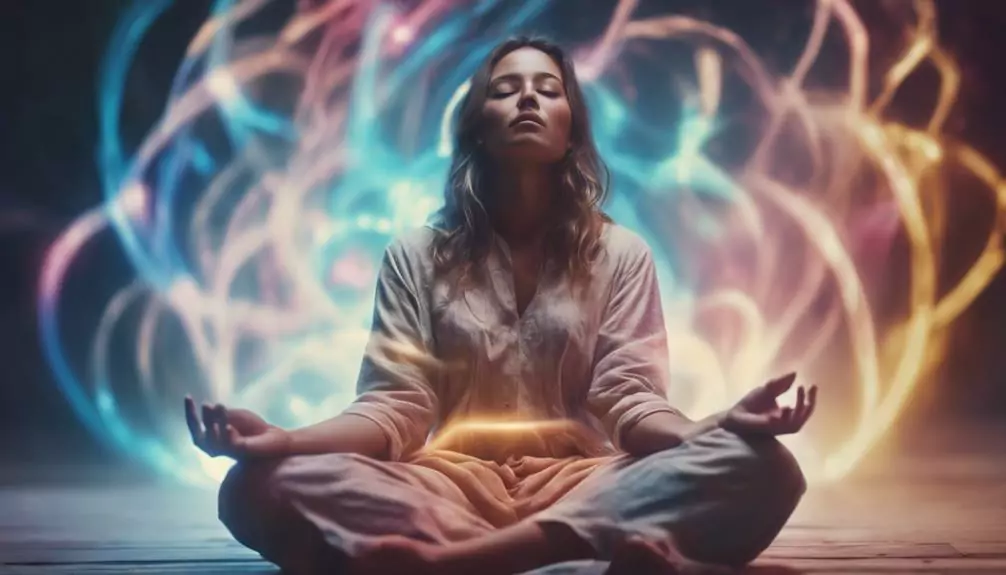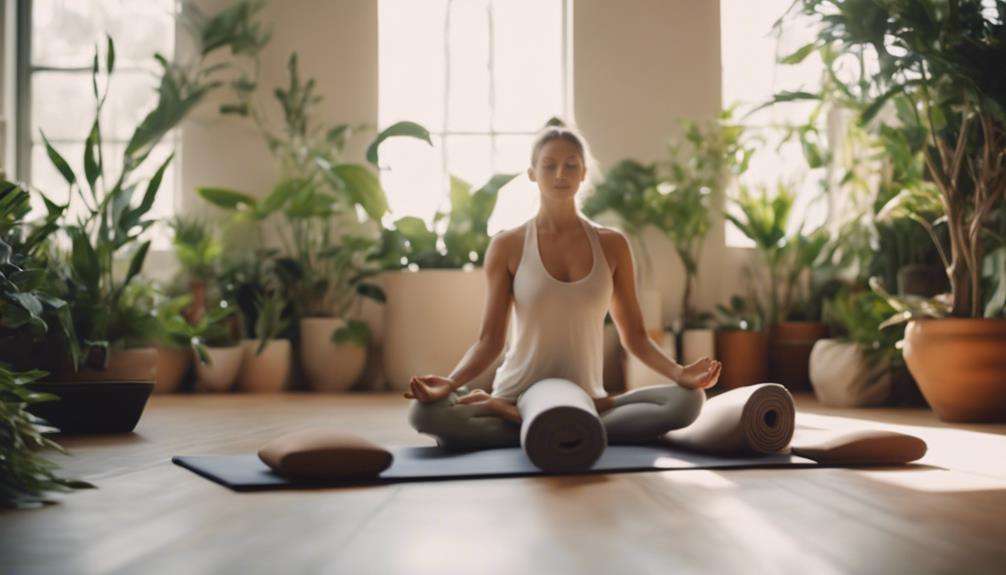Imagine your mind as a vast ocean, sometimes turbulent with waves of worry and stress. Now, picture yoga and meditation as gentle anchors grounding you in the present moment.
How exactly do these ancient practices help in calming the storm within? By exploring the intricate connection between mindfulness and anxiety reduction, you'll uncover the transformative power they hold in reshaping your mental landscape.
Key Takeaways
- Yoga and meditation promote mindfulness by focusing on the present moment and calming the nervous system.
- Mindfulness practices regulate attention and emotions, reducing negative thoughts associated with anxiety.
- Regular yoga practice enhances self-awareness, stress management, and emotional understanding for anxiety relief.
- Incorporating yoga poses and meditation techniques offers a holistic approach to reducing anxiety through mindfulness.
Mindfulness Benefits of Yoga for Anxiety Relief
How can practicing yoga enhance mindfulness to alleviate anxiety symptoms effectively?
Yoga is a powerful tool in promoting mindfulness, a key component in reducing anxiety. By focusing on the present moment, yoga encourages individuals to be fully aware of their breath and movement, helping to quiet the mind and calm anxious thoughts. Poses like Child's Pose and Corpse Pose promote relaxation, which can significantly reduce symptoms of anxiety.
Through regular practice, individuals can improve self-awareness, better manage stress levels, and ultimately find relief from anxiety. Mindful breathing techniques utilized in yoga play a crucial role in calming the nervous system and alleviating feelings of anxiety. Additionally, yoga's emphasis on the mind-body connection enhances mental clarity, providing individuals with a deeper understanding of their emotions and thought patterns.
The Role of Meditation in Anxiety Reduction
Mindfulness meditation plays a pivotal role in reducing anxiety symptoms by training attention for calm concentration and fostering positive emotions. Studies have shown the significant impact of mindfulness practices, such as mindfulness-based cognitive therapy (MBCT) and Mindfulness-Based Stress Reduction (MBSR), on mental health and cognitive processes.
Here are three key points highlighting the role of meditation in anxiety reduction:
- Research supports the effectiveness of mindfulness-based interventions like MBSR and MBCT in decreasing anxiety levels.
- Mindfulness meditation helps regulate attention and emotions, leading to a reduction in negative thoughts and improved focus.
- Practicing mindfulness enables individuals to worry less and react better in stressful situations, enhancing coping skills.
Enhancing Mindfulness Through Yoga Practice
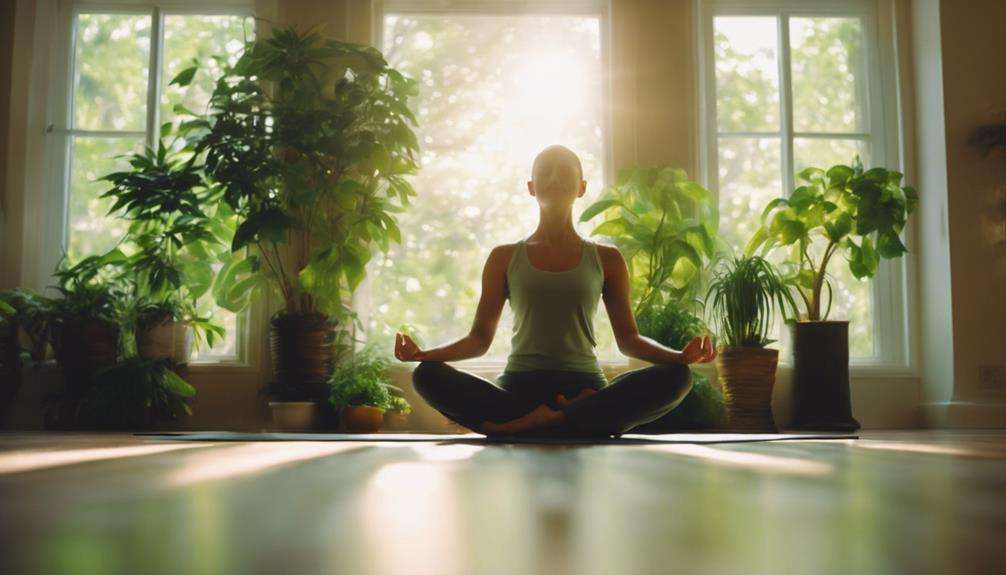
To deepen your understanding of how mindfulness can be further enhanced, exploring the integration of yoga practice is essential. Yoga practice serves as a powerful tool for enhancing mindfulness through various techniques such as breath control and body awareness. By focusing on the breath and tuning into the sensations of the body during yoga poses, individuals can cultivate a heightened sense of awareness in the present moment. This mindful movement in yoga sequences not only promotes concentration but also induces a state of relaxation, reducing anxiety and stress levels.
Regular engagement in yoga practice not only enhances mindfulness but also fosters self-awareness and emotional regulation. By immersing yourself in the practice, you can develop a deeper connection with your thoughts and emotions, allowing for better control and understanding of your inner experiences. Through the combination of breath control, body awareness, and mindful movement, yoga becomes a holistic approach to promoting relaxation and reducing anxiety, ultimately leading to a greater sense of well-being.
Yoga Poses for Cultivating Mindfulness
Incorporating specific yoga poses into your practice can significantly enhance your mindfulness and promote relaxation. Certain poses are particularly effective in cultivating mindfulness and promoting a sense of inner peace. Here are three key yoga poses that can help you deepen your mindfulness practice:
- Child's Pose and Corpse Pose encourage relaxation and mindfulness by promoting deep breathing and body awareness.
- Cat-Cow Pose and Downward-Facing Dog aid in cultivating mindfulness through the focus on breath and movement coordination.
- Cobra Pose allows for enhanced body-mind connection and mindfulness by increasing spinal flexibility and awareness of bodily sensations.
Meditation Techniques for Anxiety Management
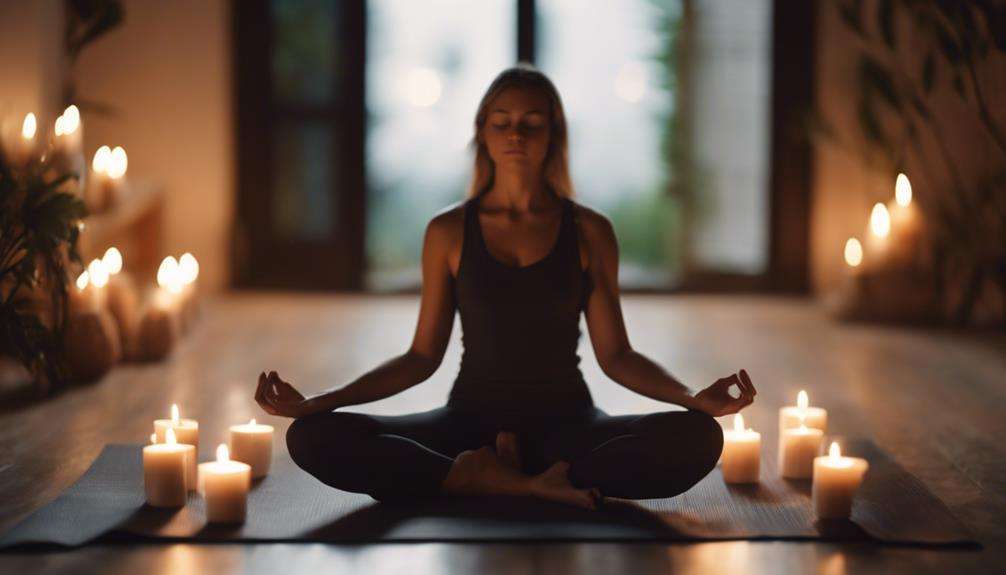
Utilizing deep breathing exercises can be an effective technique for managing anxiety symptoms, promoting relaxation, and reducing stress levels. Deep breathing helps activate the body's relaxation response, calming the nervous system and decreasing feelings of anxiety.
Body scan meditation is another beneficial practice for anxiety management. By increasing body awareness and promoting relaxation throughout different parts of the body, this technique can alleviate physical tension associated with anxiety symptoms.
Mindfulness meditation is particularly useful for calming anxious feelings by encouraging individuals to focus on the present moment, reducing overthinking about the future or past.
Engaging in loving-kindness meditation fosters self-compassion, which can be instrumental in managing anxiety and improving overall well-being.
Visualization techniques involving positive mental imagery can also aid in anxiety reduction by promoting relaxation and creating a sense of calm. Incorporating these meditation practices into your routine can help you cultivate a greater sense of relaxation and manage anxiety more effectively.
Frequently Asked Questions
How Does Mindfulness and Meditation Help Anxiety?
When you practice mindfulness meditation, you learn to focus on the present, observe thoughts without judgment, and regulate emotions. This helps reduce anxiety by promoting relaxation, self-compassion, and emotional regulation, fostering a sense of calm and clarity.
How Does Yoga and Meditation Help With Anxiety?
You know how yoga and meditation offer stress relief, emotional regulation, and a calm mind. They help manage anxiety, enhance the mind-body connection, trigger the relaxation response, and boost self-awareness, all in the present moment.
How Does Yoga Help With Mindfulness?
Yoga poses enhance mindfulness by promoting body awareness and mind-body connection. Through mindful movement and breath-centered practices, yoga fosters stress reduction, emotional regulation, and relaxation responses. Engaging in yoga cultivates a deeper sense of presence and awareness.
How Mindfulness Techniques Such as Yoga Can Affect the Nervous System to Change?
Mindfulness techniques, like yoga, impact your nervous system by regulating stress responses, lowering cortisol levels, and activating the parasympathetic system. This enhances the mind-body connection, promotes emotional regulation, and rewires neural pathways for self-awareness and relaxation.
Conclusion
As you reflect on the calming effects of yoga and meditation, consider how these practices can transform your anxious thoughts into moments of peace and clarity.
By embracing mindfulness through yoga poses and meditation techniques, you have the power to cultivate a sense of inner strength and resilience.
The evidence is clear: mindfulness is the key to unlocking a path towards anxiety reduction and overall mental well-being.
So take a deep breath, center yourself, and let mindfulness guide you towards a more peaceful existence.
